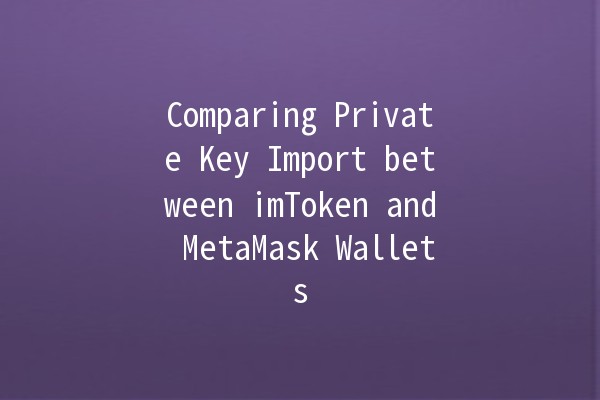In the world of cryptocurrency, wallets play a crucial role in managing digital assets. imToken and MetaMask are two of the most widely used wallets that cater to different user needs. This article will provide an indepth comparison of how to import private keys into both imToken and MetaMask wallets. Understanding the differences and nuances of each can help users make better choices when managing their cryptocurrency holdings.

imToken is a popular digital asset wallet focusing on providing a seamless user experience for both beginners and advanced cryptocurrency users. It supports multiple blockchains, including Ethereum and Bitcoin, and provides users with the option to manage their professional crypto portfolios effortlessly. One standout feature is its builtin decentralized exchange (DEX), allowing users to trade seamlessly within the app.
MetaMask, on the other hand, is primarily an Ethereumbased wallet that also supports the Ethereum network's tokens (ERC20). MetaMask works as a browser extension and a mobile application, allowing users to interact easily with decentralized applications (DApps) on the Ethereum blockchain. MetaMask’s user interface is straightforward, making it accessible for newcomers while maintaining advanced features for seasoned users.
Private keys are critical in managing cryptocurrency funds; they provide access to the wallet. Losing a private key means losing access to the corresponding funds. When dealing with private keys, it is essential to understand how to import them correctly into your wallet of choice. Importing a private key allows you to access funds associated with that key, regardless of the platform being used.
When importing private keys, always ensure you are using a secure network and device. Phishing attacks are common, so verify the authenticity of the wallet you are using. Both imToken and MetaMask prioritize security, but users must stay vigilant.
Always back up your private keys and keep them in a secure place.
If you encounter any issues during import, ensure you are using the correct format for your private key.
Ensure your private key is copied completely and without errors.
Use hardware wallets to generate and securely back up private keys.
While importing private keys is vital, managing your wallets effectively enhances the overall user experience. Below are five productivity tips for imToken and MetaMask users:
Description: Set up multiple accounts within your wallet to separate different types of assets.
Example: For instance, create one account for longterm investments and another for trading. This segregation helps in tracking and managing funds more efficiently.
Description: Consistently back up your wallets and remember to save recovery phrases securely.
Example: Use cloud storage with strong encryption or write down phrases and store them in a bank safety deposit box to avoid losing access to funds.
Description: Whenever possible, enable 2FA to add an extra layer of security to your wallet.
Example: Utilize an authentication app like Google Authenticator to generate codes for logging in or conducting transactions, making unauthorized access more challenging.
Description: Regularly update yourself on the latest cryptocurrency security practices.
Example: Follow reputable sources or forums that discuss new threats and security measures to adopt, ensuring your funds remain secure.
Description: Make use of DApps available on both platforms to leverage decentralized finance.
Example: Access DeFi protocols to yield farm or lend out assets for interest, maximizing the potential of your crypto holdings.
A private key is a long string of characters that allows access to your cryptocurrency wallet. It is crucial to keep it secure as anyone with access to it can control the funds within the associated wallet.
If you lose your private key, you lose access to the cryptocurrency associated with it. There is no way to recover lost keys, emphasizing the importance of backups.
Yes, both imToken and MetaMask support importing multiple private keys. This feature allows users to manage multiple wallets conveniently in one interface.
Yes, your public key is safe to share. It is used to receive funds and does not provide access to your wallet. However, never share your private key or recovery phrase.
Typically, there are no fees for importing private keys; however, transaction fees may apply when sending or receiving assets. Always check current gas fees on the Ethereum network.
To enhance the security of your wallet, consider using hardware wallets for cold storage, enabling 2FA, regularly updating security practices, and being mindful of phishing attempts.
When it comes to choosing a wallet, understanding the differences in how private key imports are handled by imToken and MetaMask can significantly affect your experience. Utilizing the provided tips can enhance your control over your cryptocurrencies, ensuring that your assets are secure. Each wallet has its strengths, so selecting one that fits your specific needs is crucial for effective wallet management.